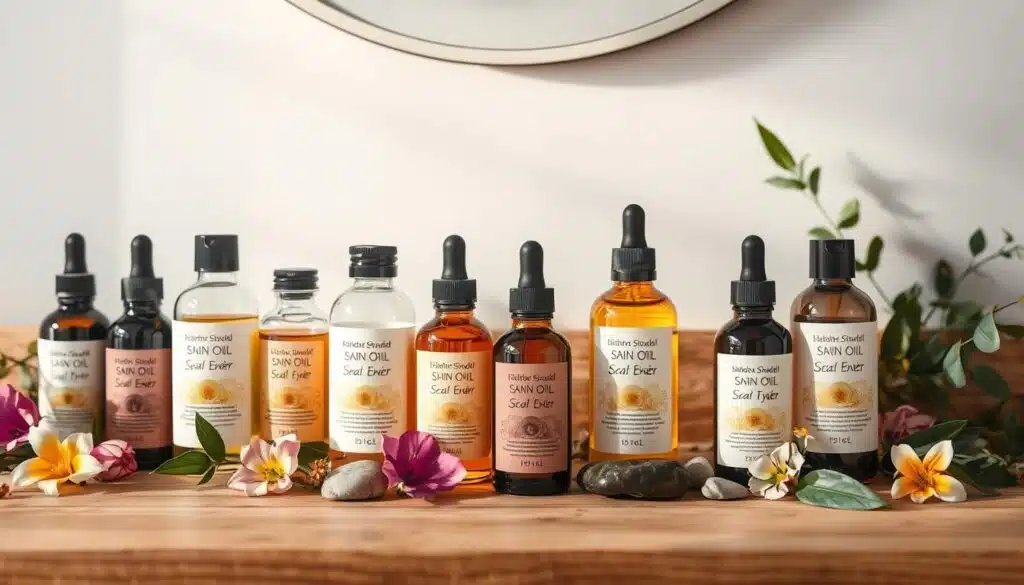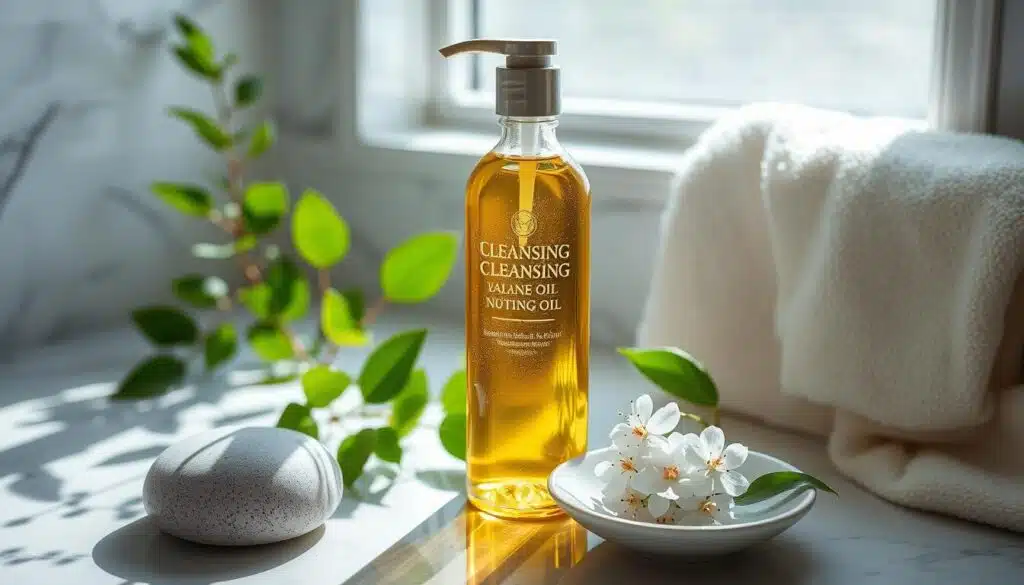Cleansing Oil Benefits Oil cleansing is a gentle way to remove makeup, dirt, and extra oil from your skin. It uses nourishing oils to clean your skin without taking away its natural oils. This method is good for all skin types, including oily and acne-prone skin, by balancing oil and strengthening the skin barrier.
Cleansing oils are full of antioxidants and essential fatty acids. These help nourish and protect your skin. This leads to a radiant and hydrated look.
Key Takeaways
- Oil cleansing effectively removes makeup, dirt, and excess sebum without disrupting the skin’s natural oils.
- Cleansing oils can benefit all skin types, including oily and acne-prone, by balancing oil production and strengthening the skin barrier.
- Oils rich in antioxidants and essential fatty acids nourish and protect the skin, promoting a radiant and hydrated complexion.
- The “like dissolves like” principle makes oil cleansing a gentle and effective method for cleansing the skin.
- Oil cleansers are suitable as the first step in a skincare routine, particularly for removing waterproof makeup and sunscreen.
Understanding Oil Cleansing: The Science Behind the Method
Oil cleansing is a skincare method that uses the “like dissolves like” principle. It removes impurities and nourishes the skin. This method uses oil-based cleansers to dissolve substances like sebum, makeup, and pollutants.
How Oil Cleansing Works
The oil cleanser interacts with your skin’s natural oils and sebum. It emulsifies and lifts away impurities gently. This leaves your skin clean, refreshed, and balanced.
The “Like Dissolves Like” Principle
The “like dissolves like” principle is the basis of oil cleansing. It means oil-based substances can dissolve and remove other oil-based impurities. Using an oil-based cleanser helps target and remove sebum, makeup, and pollutants from your pores and skin barrier.
Types of Cleansing Oils and Their Properties
There are many types of oil cleansers, each with unique properties and benefits. They include pure oils, oil blends, and emulsifying formulas. Choosing the right oil cleanser can thoroughly clean and nourish your skin.
| Oil Type | Key Properties | Suitable Skin Types |
|---|---|---|
| Jojoba Oil | Balances oil production, anti-inflammatory, helps repair skin barrier | Oily, acne-prone |
| Argan Oil | Deeply moisturizing, rich in antioxidants, improves skin elasticity | Dry, mature |
| Coconut Oil | Anti-inflammatory, antimicrobial, helps retain skin moisture | Dry, eczema-prone |
| Sea buck thorn Oil | Brightens, evens skin tone, supports skin barrier function | Dull, uneven complexion |
Understanding oil cleansing and the different oils can help you choose the best oil-based cleanser for your skin. This can lead to a healthy, radiant complexion.
Cleansing Oil Benefits for All Skin Types
Cleansing oils are great for all skin types, from sensitive to oily. They gently remove makeup, sunscreen, and pollutants. They also keep your skin’s moisture balanced.
They prevent water loss from your skin. This helps keep your skin hydrated and prevents dryness. It’s especially good for sensitive or dry skin, as it soothes and nourishes.
For oily or acne-prone skin, cleansing oils are a big help. They balance your skin’s oil, reducing shine and pores. The “like dissolves like” principle helps remove impurities without drying out your skin.
They also make your skin look young and radiant. The oils and surfactants in these products improve your skin’s texture and tone. Even sensitive skin can enjoy their gentle, effective cleansing.
| Skin Type | Cleansing Oil Benefits |
|---|---|
| Sensitive Skin | Hydration, Gentle Cleansing, Soothing |
| Oily/Acne-Prone Skin | Balances Sebum, Minimizes Pores, Removes Impurities |
| Dry Skin | Prevents Trans-Epidermal Water Loss, Nourishing |
| Combination Skin | Balances Oil Production, Gentle Cleansing |
Whether you have sensitive skin, too much sebum, or want a radiant complexion, a cleansing oil can change your game. These products nourish, cleanse, and make your skin glow.
Choosing the Right Oil Cleanser for Your Skin Type
Choosing the right oil cleanser is key for your skin type. The right oil can clean your skin well and keep it hydrated. Let’s look at the best oils for each skin type.
Best Oils for Oily and Acne-Prone Skin
If you have oily or acne-prone skin, choose light carrier oils. Jojoba oil, hemp seed oil, or grapeseed oil are good. They help control oil and prevent breakouts.
Recommended Oils for Dry and Sensitive Skin
For dry and sensitive skin, go for nourishing oils. Olive oil, avocado oil, or rosehip oil are great. They’re full of good fats and antioxidants that heal your skin.
Essential Ingredients to Look For
When picking an oil cleanser, look for antioxidants, essential fatty acids, and clary sage. These add extra benefits to your skincare routine.
Finding the right oil for your skin type is important. It leads to clean, healthy, and glowing skin.
Proper Oil Cleansing Technique and Application Methods
Adding oil cleansing to your skincare routine can change your skin for the better. It’s all about the right technique and how you apply it. Let’s go through the steps to make sure you get the most out of oil cleansing.
Begin by putting a few drops of oil cleanser on dry skin. Use your fingertips to massage it into your face in circles. Focus on spots with makeup or impurities to clean.
For the eyes, use a soft rubbing motion on closed eyes to remove eye makeup. This gently cleanses the area without irritation.
After massaging the oil well, add water to mix it. This turns the oil into a milky, easy-to-rinse liquid. Massage this mixture, then rinse with lukewarm water to remove all residue.
Pat your skin dry with a soft towel after rinsing. You can do the oil cleansing routine in the morning and night. Being consistent is crucial for the best results.
By following these steps, you’re on your way to glowing, healthy skin. Embrace oil cleansing and make it a key part of your cleansing routine.
Addressing Common Concerns About Oil Cleansing
Many people with oily or acne-prone skin worry about oil cleansers. They fear they might make excess oil worse and cause breakouts. But, oil cleansing can actually help balance oil levels and prevent skin irritation and breakouts. It’s all about understanding the science behind this gentle yet effective method.
The “like dissolves like” principle is the basis of oil cleansing. Oils can dissolve and remove other oils, like sebum, makeup, and impurities. This happens without harming the skin’s natural barrier function. Oil cleansers are often gentler and more effective than harsher cleansers that can strip the skin, leading to more oil production.
| Skin Type | Recommended Cleansing Oil |
|---|---|
| Oily/Acne-Prone | Jojoba, Rosehip, or Tamanu Oil |
| Dry/Sensitive | Argan, Marula, or Safflower Oil |
If you get skin irritation or breakouts after trying oil cleansing, it might be because of the wrong oil or technique. Always test new products on a small area first. If you have ongoing skin issues, talk to a dermatologist.
“Oil cleansing is a versatile method suitable for all skin types, from blemish-prone to sensitive skin.”
By grasping the science behind oil cleansing and picking the right oil for your skin type, you can enjoy its benefits. This gentle, yet effective, cleansing method can lead to healthier, more radiant-looking skin.
Incorporating Oil Cleansing into Your Skincare Routine
Adding oil cleansing to your routine can change your skin for the better. It uses natural oils to cleanse your skin, get rid of dirt, and make your skin glow.
Start with a double cleansing method. First, use an oil-based facial cleanser to remove makeup and dirt. Then, use a water-based cleanser to clean your skin well and refresh it.
If you have dry or sensitive skin, oil cleansing might be enough. It keeps your skin moist without drying it out. Always use a toner, serum, and moisturize after to keep your skin hydrated and nourished.
Change how often you oil cleanse based on your skin’s needs. Many people find oil cleansing 1-2 times a day, especially at night, works best.
“Oil cleansing has been a game-changer for my skin. It’s helped reduce blemishes, minimize pores, and leave my complexion feeling soft, supple, and radiant.” – Sarah, 32
By double cleansing and adding oil cleansing, you get a deeper clean. It also helps protect and nourish your skin’s natural barrier.
Also Read : Budgeting Tips For Beginners: Start Managing Your Money Today
Conclusion
Oil cleansing is great for all skin types. It balances oil, boosts hydration, and makes skin radiant. By picking the right oil for your skin, you can make your skincare routine better.
Oil cleansers work well alone or with other products. They clean your skin deeply. But, be careful if you have dry or sensitive skin. Some oils might cause breakouts.
Adding oil cleansing to your routine can change your skin for the better. The Kindred brand’s Complete Cleanse is a great example. It uses natural ingredients like Castor oil and Grape seed oil to make your skin glow.
FAQs
Q: What is the oil cleansing method?
A: The oil cleansing method is a skincare routine that involves using oil to cleanse your skin. It effectively removes impurities, makeup, and excess oil without stripping the skin’s natural moisture.
Q: How do I choose a cleansing oil for my skin type?
A: When choosing a cleansing oil, consider your skin type. For oily skin, opt for oils like sunflower oil or castor oil that help balance oil production. For dry skin, lighter oils such as jojoba or almond oil can nourish and hydrate.
Q: What are the benefits of oil cleansing?
A: The benefits of oil cleansing include deep cleansing without stripping the skin, promoting radiant skin, effectively removing makeup and sunscreen, and nourishing the skin with essential fatty acids.
Q: Can I use the oil cleansing method every day?
A: Yes, you can use the oil cleansing method every day, but you may want to start with 2-3 times a week and allow your skin to adjust to the new routine.
Q: How do I properly use cleansing oil?
A: To use cleansing oil, apply a small amount onto dry hands and massage it onto your dry face for about a minute. This helps to dissolve makeup and impurities. Then, add warm water to emulsify the oil, and rinse thoroughly to cleanse your face.
Q: Will oil cleansing cause breakouts?
A: Oil cleansing can help reduce breakouts by removing impurities and dead skin cells. However, it’s essential to choose the right oil for your skin type and ensure you rinse off thoroughly to avoid oil residue.
Q: Can I use a facial cleansing oil if I have acne-prone skin?
A: Yes, many facial cleansing oils are suitable for acne-prone skin. Look for non-comedogenic oils that won’t clog pores, such as jojoba oil or grapeseed oil, to help clear your skin while nourishing it.
Q: How does oil cleansing contribute to glowing skin?
A: Oil cleansing helps to remove dead skin cells and impurities, promoting cell turnover and allowing your skin to breathe. This process can lead to a more radiant and glowing complexion over time.
Q: Should I follow oil cleansing with a face mask?
A: Following oil cleansing with a face mask can enhance your skincare routine. A mask can help hydrate, detoxify, or target specific skin concerns after you’ve effectively cleansed your skin.
Q: What should I do if my skin feels oily after using cleansing oil?
A: If your skin feels oily after using cleansing oil, ensure you’re using the right amount and rinsing thoroughly. You may also want to try a lighter oil or adjust the frequency of your oil cleansing routine.










